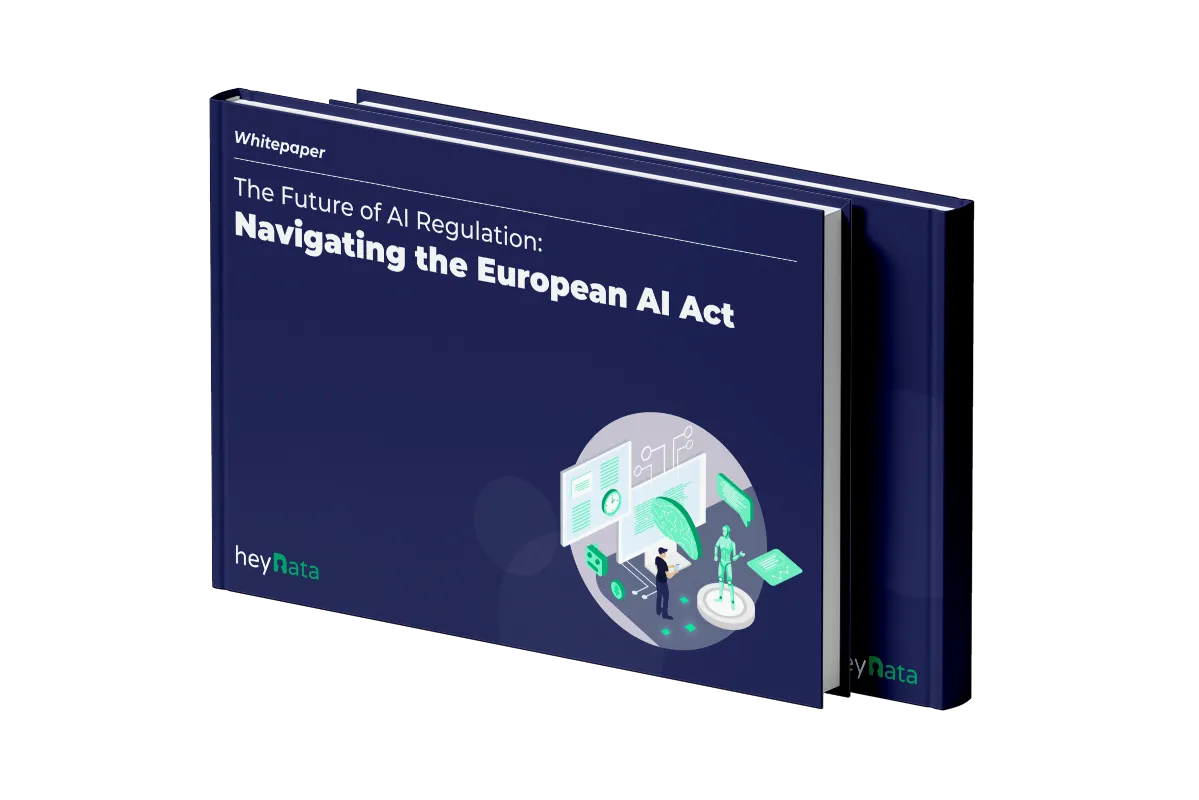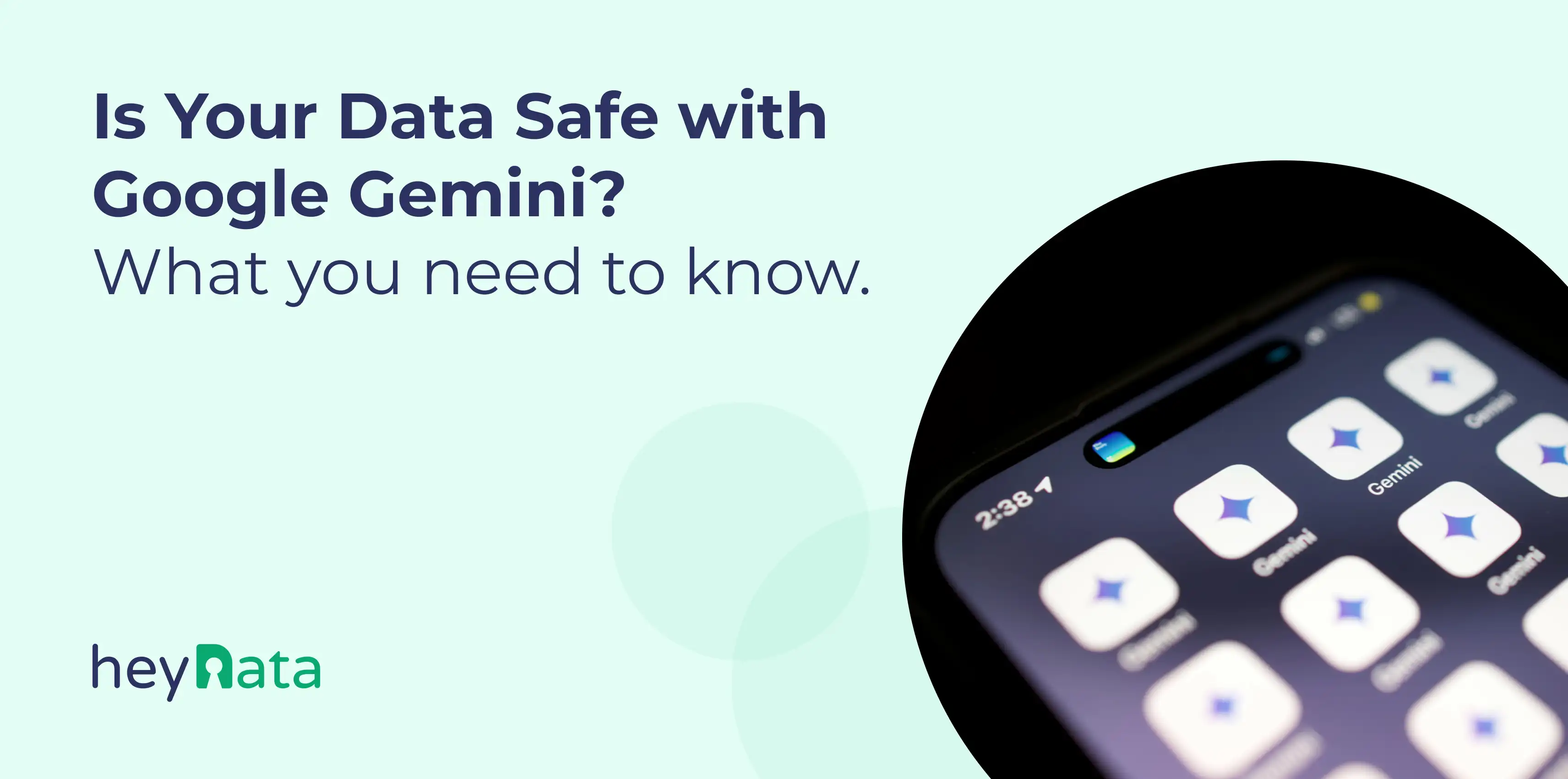
Get our White paper on the EU AI

How Safe Is Your Data with Google Gemini? Privacy Risks, Storage Policies & Compliance Tips
'%3e%3cpath%20d='M26.6667%2020.022L30%2023.3553V26.6886H21.6667V36.6886L20%2038.3553L18.3333%2036.6886V26.6886H10V23.3553L13.3333%2020.022V8.35531H11.6667V5.02197H28.3333V8.35531H26.6667V20.022Z'%20fill='%230AA971'/%3e%3c/g%3e%3c/svg%3e) Summary
Summary
- Gemini is Google’s central AI platform – Bard is fully integrated.
- Users can set data retention to 3, 18, or 36 months, or disable it.
- Even with opt-out, conversations may be stored for 72 hours.
- Human reviewers may analyze interactions to improve AI quality.
- Using Gemini comes with privacy and data protection concerns.
- heyData offers compliance training and vendor risk management tools.
Introduction
In today’s business landscape, small and medium-sized enterprises (SMEs) must strengthen their digital presence and leverage cutting-edge AI technologies like Google’s new Gemini Apps. However, companies must be aware of the privacy implications associated with using these applications. Here's a breakdown of key information and actions available to users concerned about their privacy.
Table of Contents:
What is Gemini?
Formerly known as Google Bard, Gemini is a cutting-edge AI model developed by Google designed to empower users and SMEs in crafting content across diverse formats, including text, images, audio, and video. The AI is built to provide more context-aware responses, supporting businesses in optimizing workflows and enhancing content creation.
The tech giant has recently introduced Gemini Advanced, a premium version seamlessly integrated into the AI Premium plan within the Google One subscription service. Powered by the latest Gemini 1.5 model, this version offers an extended context window and improved processing capabilities, enabling users to deliver more detailed and complex prompts with greater accuracy.
Gemini Advanced distinguishes itself with an enhanced ability to grasp nuanced instructions, allowing users to deliver more extensive prompts while ensuring a heightened level of contextual comprehension. Google has officially confirmed that Bard is now fully integrated into Gemini, consolidating its AI services under the Gemini branding as part of its broader AI strategy.

Get our White paper on the EU AI
Google Gemini and Bard
Bard was originally launched as Google’s conversational AI, built on the LaMDA model and designed to support personalized, dialogue-based interactions. In early 2024, Google fully integrated Bard into Gemini, consolidating its AI efforts under one brand.
Today, Gemini is not just a chatbot, but a multifunctional AI platform that combines content generation, coding support, and extended contextual understanding. This makes Gemini Google’s most advanced and comprehensive AI tool to date – designed for both creative and professional business use cases across formats like text, code, audio, and visuals.
Related Blog: What is Google Bard? ChatGPT’s New Rival in Conversational AI
What is Google Bard used for?
Much like ChatGPT, Google Gemini (formerly) Bard is an invaluable AI tool, serving as a brainstorming and collaborative assistant that allows users to craft essays, articles, emails, stories, and even poems. Google has also taken Bard to new heights by enhancing its capabilities to aid in coding and debugging tasks. Additionally, Google has expanded its capabilities from text generation to support coding and debugging tasks, which makes it a versatile resource for developers.
However, although Gemini's text output is remarkable, Google advises users to consider the tool as a starting point rather than a final product as the AI continues to evolve and improve.
Gemini Data Collection and Storage
Google stores user data from Gemini Apps in the user's Google Account for a default retention period of 18 months. Users have the option to limit data retention to either 3 or 36 months. If you prefer to use Gemini Apps without saving conversations in your Google Account, you can disable the Gemini Apps activity. However, according to Gemini's privacy notice: “Even if this feature is turned off, conversations will still be stored in your account for up to 72 hours to facilitate service delivery and process feedback. This activity will not appear in your Gemini Apps activity.” This short-term storage is not reflected in the Gemini Apps Activity settings but remains accessible for internal processing.
Human Reviews of User Gemini Data
Google retains user data reviewed and annotated by human reviewers for up to three years to improve AI models. This information, along with feedback and related metadata such as language, device type, or location, is kept separately and is not connected to the user's Google Account. Human-reviewed data is utilized to train datasets for generative machine-learning models, enhancing their accuracy and contextual understanding over time.
Gemini and Third-Party Data Sharing
Using Gemini Apps may lead to third-party data sharing. Even if the Gemini Apps Activity setting is turned off or deleted, other settings like Web & App Activity or Location History may continue to save location and other data. Integration with other Google services or third-party services may result in data processing following their respective privacy policies.
According to Google's privacy support, “when you integrate and use Gemini Apps with other Google services, they will save and use your data to provide and improve their services, consistent with their policies and the Google Privacy Policy. If you use Gemini Apps to interact with third-party services, they will process your data according to their privacy policies.”
Protect Your Data Privacy on Gemini Apps
When using Gemini Apps, it's crucial to safeguard your confidential information and maintain privacy. Data privacy experts strongly advise against sharing sensitive data, as human reviewers may analyze your conversations to enhance machine-learning models. To ensure your privacy:
- Be Mindful of Content: Avoid entering confidential information or data you wouldn't want human reviewers to see. Refrain from sharing sensitive details that could compromise your privacy.
- Exercise Caution with Data: Only input information you are comfortable with Google using to improve its products, services, and machine-learning technologies. Exercise discretion in sharing personal details.
- Review Privacy Settings: Regularly check and adjust your privacy settings on Gemini Apps. Stay informed about any updates or changes to privacy policies to make informed decisions about your data.
- Employee compliance training: Invest in effective compliance courses, like heyData’s employee compliance training, to provide a thorough understanding of crucial regulations such as GDPR and cybersecurity, streamlining their work and ensuring adherence to compliance standards.
- Opt-Out for Added Privacy: Take advantage of the option to turn off Gemini Apps Activity. By doing so, you prevent your data from being shown to human reviewers, ensuring that your conversations are not used to create datasets for product improvement. However, keep in mind that Google will still store data for up to 72 hours as a backup and for sharing with other Google services and third-party services that users may interact with while using Gemini.
Google may still process interactions anonymously for system improvements, even if Gemini Apps are used logged out.
Related blog: Employee Data Privacy Awareness Training Best Practices
Conclusion
While Google's Gemini Apps offer powerful AI-driven tools for SMEs, businesses must beware of data privacy risks. It's worth noting that Google, with its extensive tracking capabilities and advertising-driven revenue model means that data that is collected through its ecosystem (including Gemini Apps) can be used to enhance AI training and advertising strategies.
In light of this, companies must exercise caution, understanding the implications of their digital choices within Google's broader business model. Businesses can harness AI's benefits whilst safeguarding sensitive data in an evolving regulatory landscape by taking a privacy-first approach.
Businesses should effectively leverage AI while maintaining compliance by:
- Understanding Data Sharing Practices – Reviewing how Gemini Apps interact with Google’s broader data collection policies.
- Adopting a Privacy-First Strategy – Regularly updating privacy settings and limiting unnecessary data sharing.
- Staying Ahead of Compliance – Monitoring evolving regulations like GDPR, the EU AI Act, and other global data protection laws.
By making informed digital choices, businesses can maximize the benefits of AI tools like Gemini while maintaining control over their data in an increasingly regulated environment.
Today, Vendor Risk Management (VRM) emerges as a pivotal aspect for businesses, ensuring the security and privacy of their data when collaborating with third-party vendors. Implementing a robust VRM solution, such as heyData's Vendor Risk Management, empowers businesses to swiftly and reliably assess compliance with regulations like GDPR, effectively minimizing potential risks associated with third-party involvement.
Take the first step in fortifying your data security, explore heyData's Vendor Risk Management solution today. Safeguard your business, and protect your data. Book a demo!
Frequently Asked Questions (FAQs)
What happens to my data when I use Gemini?
By default, Google saves your Gemini interactions in your account and may use them to improve AI models – including through human review.
Can I prevent my data from being stored permanently?
Yes, you can limit or disable data retention in your account settings. However, Google may still retain your conversations for up to 72 hours temporarily.
Does Gemini process third-party data too?
Yes, especially when integrated with other Google or third-party services. In these cases, their individual privacy policies apply.
Is Gemini GDPR-compliant?
Not fully. Aspects such as data processing, potential human review, and third-party data sharing raise GDPR compliance concerns.
How can businesses stay compliant when using AI tools like Gemini?
By setting clear usage policies, training staff, and using tools like heyData’s Vendor Risk Management to assess and minimize compliance risks.
Important: The content of this article is for informational purposes only and does not constitute legal advice. The information provided here is no substitute for personalized legal advice from a data protection officer or an attorney. We do not guarantee that the information provided is up to date, complete, or accurate. Any actions taken on the basis of the information contained in this article are at your own risk. We recommend that you always consult a data protection officer or an attorney with any legal questions or problems.


